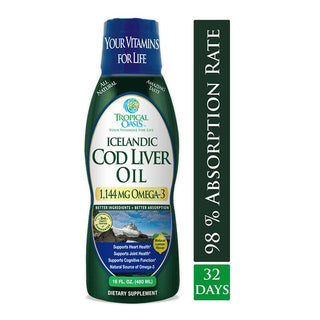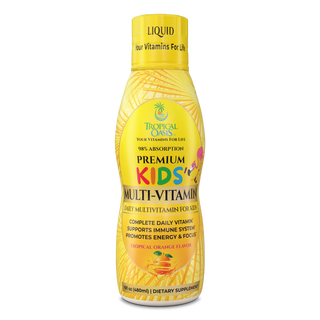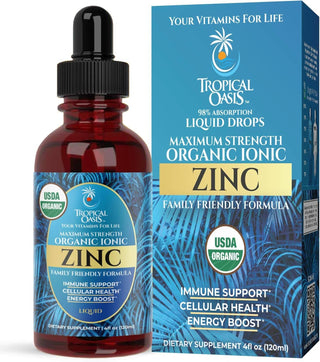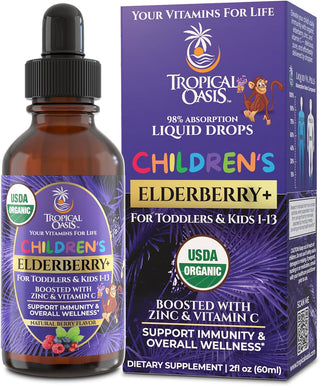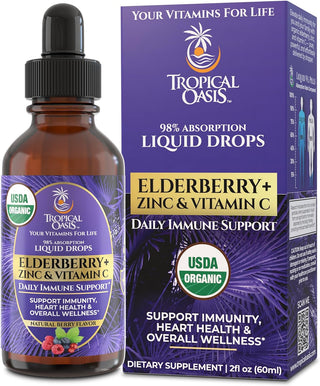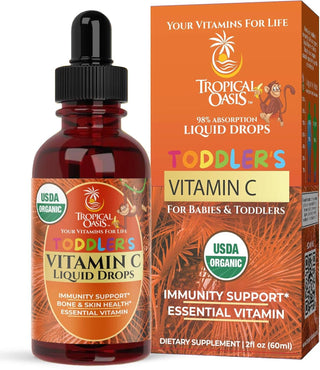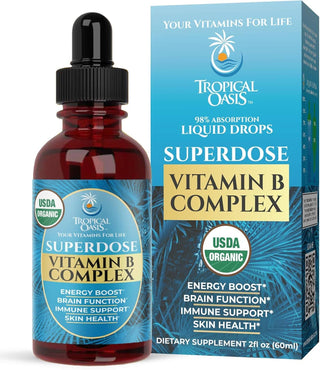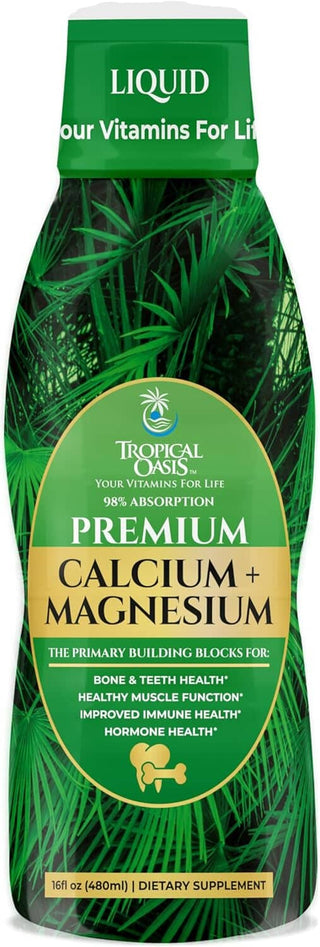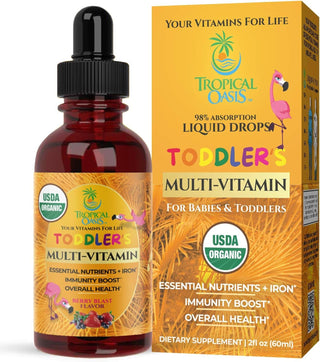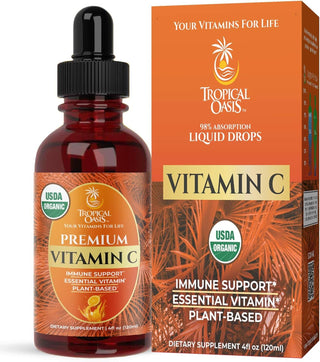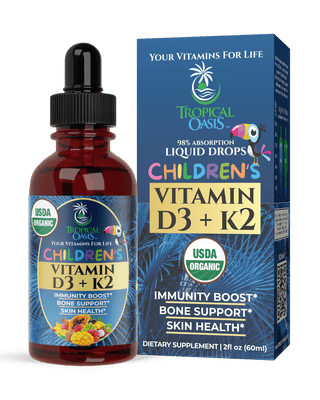Best Liquid Multivitamin For Kids
Are you confident your child is getting all the nutrients they need from their diet? With busy schedules and selective eating habits, it can be tough to ensure they're fully nourished. Think of it like building a sturdy house—without the right materials, it simply won’t hold up. At Tropical Oasis, we’ve spent over two decades perfecting liquid multivitamins to fill these nutritional gaps effectively. Our expertise ensures your child gets the essential nutrients they need for healthy growth. In this article, we will discuss the essential nutrients provided by multivitamins for kids, how to choose the right one, and when to introduce them to your child’s diet.
Organic Liquid Vitamin Elderberry Drops with Vitamin C and Zinc for Adults & Kids
$24.95
- Unit price
- /per
You’re viewing 1-11 of 11 products
Key Takeaways:
- Nutrient Gaps: Multivitamins help fill nutritional gaps in a child’s diet, especially during periods of rapid growth or picky eating phases.
- Safety First: It’s important to choose the right multivitamin for your child’s age and needs, while adhering to recommended dosages to avoid potential risks.
- Supplement, Not Replace: Multivitamins should complement a healthy diet, not replace it, ensuring your child gets the nutrients they need to thrive.
Why Are Multivitamins Important For Children?
Children are in a critical stage of growth and development, making it essential for them to receive an adequate amount of vitamins and minerals. Multivitamins play a vital role in supporting various bodily functions, such as bone development, immune system strength, and cognitive growth. While ideally, children should obtain all their nutrients from a well-balanced diet, factors like picky eating habits, food allergies, or specific dietary restrictions can make this difficult. Multivitamins act as a safety net, ensuring that children receive the essential nutrients they need, even when their diet is less than perfect.
Key Nutrients In Multivitamins For Kids
Multivitamins for kids are formulated with a range of essential nutrients that support their overall health and development. These nutrients are vital for various bodily functions, ensuring that children grow up healthy and strong. Here are some of the key nutrients typically found in these supplements:
Vitamin A
Vital for vision, immune function, and skin health, Vitamin A plays a crucial role in maintaining healthy eyesight, especially in low-light conditions. It also supports the immune system by keeping the skin and mucous membranes, which are the body's first line of defense, healthy and intact.
Vitamin C
Vitamin C is a powerful antioxidant that supports the immune system by helping white blood cells function more effectively and protecting them from harmful molecules. Additionally, it promotes healthy skin by aiding in collagen production, which is necessary for the repair and maintenance of skin tissues, and it also speeds up wound healing.
Vitamin D
Crucial for bone health, Vitamin D helps the body absorb calcium, which is necessary for the development and maintenance of strong bones and teeth. It also plays a significant role in regulating the immune system and preventing chronic diseases that can occur later in life.
B Vitamins (B1, B2, B6, B12)
B Vitamins are important for energy production as they help convert the food children eat into energy that their bodies can use. They also support brain development and cognitive function by contributing to the formation of neurotransmitters and the maintenance of healthy nerve cells, and they are essential for the formation of red blood cells, which carry oxygen throughout the body.
Calcium
Calcium is essential for strong bones and teeth, especially during childhood when the skeleton is growing rapidly. Adequate calcium intake during these years helps to ensure peak bone mass, reducing the risk of osteoporosis and fractures later in life.
Iron
Iron supports cognitive development by ensuring that the brain receives enough oxygen, as it is a critical component of hemoglobin, the protein in red blood cells that carries oxygen from the lungs to the rest of the body. Iron is also vital for the production of energy and the proper functioning of the immune system, helping children stay active and healthy.
Zinc
Zinc plays a role in immune function by supporting the development and function of immune cells, and it also helps the body heal wounds more quickly by promoting cell growth and division. Additionally, zinc is essential for normal growth and development, particularly during pregnancy, childhood, and adolescence.
Iodine
Iodine is necessary for thyroid function, which regulates metabolism and is crucial for normal growth and development. Adequate iodine intake is also important for cognitive development, particularly in the early stages of life, as it helps prevent conditions like cretinism and developmental delays.
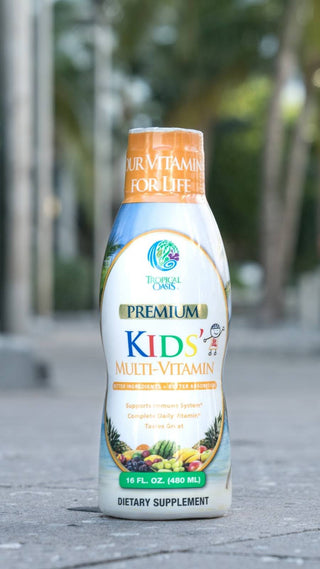
Best Multivitamins For Kids by Tropical Oasis
Ensuring your child gets the right nutrients is essential for their growth and development. Tropical Oasis offers a range of high-quality liquid supplements designed specifically for kids, making it easier to support their health every day:
Children's Premium Multiple Vitamin With Minerals
Tropical Oasis Children's Premium Multiple Vitamin with Minerals offers a comprehensive blend of essential vitamins and minerals tailored for kids. This liquid formula is designed for easy absorption, ensuring your child gets the nutrients they need for healthy growth and development. With its natural fruit flavor, it’s a tasty and convenient way to support your child’s overall health.
Calcium Magnesium
Tropical Oasis Calcium Magnesium is an excellent choice for kids needing additional bone and muscle support. This liquid supplement combines two vital minerals in a form that’s easy for young bodies to absorb. With added Vitamin D, it helps maintain strong bones and teeth while supporting muscle function, making it an essential part of your child's daily routine.
Cod Liver Oil
Tropical Oasis Cod Liver Oil provides a rich source of Omega-3 fatty acids, essential for brain development and overall health. Packed with Vitamins A and D, this liquid supplement supports immune function and promotes healthy vision. The natural lemon flavor makes it an easy addition to your child's diet, ensuring they receive the benefits without the fishy taste.
Vitamin D3 + K2 Drops for Kids
Tropical Oasis Vitamin D3 + K2 Drops for Kids offers a potent combination of two essential nutrients that work synergistically for optimal bone and heart health. These USDA Organic drops are easy to administer and help support calcium absorption, ensuring your child’s bones develop strong and healthy. With its simple and pure formula, it’s an excellent choice for supporting your child's overall well-being.
How To Choose The Right Multivitamin For Your Child
Choosing the right multivitamin for your child can be overwhelming given the variety of options available. Here are some key factors to consider:
- Age Appropriateness: Ensure that the multivitamin is specifically formulated for your child’s age group, as nutrient needs vary by age.
- Nutrient Content: Look for a multivitamin that contains the essential nutrients your child may be missing from their diet, but be cautious of excessive amounts, especially of fat-soluble vitamins like A, D, E, and K.
- Form and Flavor: Multivitamins come in various forms, including chewables, gummies, and liquid drops. Choose one that your child is likely to take consistently.
- Quality and Brand Reputation: Opt for products from reputable brands that adhere to high-quality standards. Look for certifications from third-party organizations like the USP (United States Pharmacopeia) or NSF International.
- Consultation with a Healthcare Provider: Before starting any supplement, it's always wise to consult with your child’s pediatrician to ensure the multivitamin is necessary and appropriate.
By considering these factors, you can choose a multivitamin that best supports your child’s unique health needs.
When Should Children Start Taking Multivitamins?
Deciding when to start your child on multivitamins depends on several factors, including their diet, health needs, and advice from healthcare providers. Here are some general guidelines:
Infants And Toddlers
Most infants get sufficient nutrients from breast milk or formula, which are typically fortified with essential vitamins and minerals necessary for growth and development. However, some infants, especially those who are exclusively breastfed, may need additional vitamin D or iron supplements if recommended by a pediatrician, as these nutrients might not be present in adequate amounts in breast milk alone.
Preschoolers (Ages 2-5)
Picky eating is common in this age group, which may lead to nutrient gaps, particularly if a child refuses to eat certain food groups. A multivitamin might be beneficial for preschoolers who do not consume a well-rounded diet, helping to ensure they receive the necessary vitamins and minerals to support their rapid growth and development during these formative years.
School-Age Children (Ages 6-12)
As children grow and their diets expand, they might still miss out on key nutrients, especially if they have dietary restrictions, food allergies, or are particularly selective eaters. Multivitamins can help bridge these nutritional gaps, providing essential nutrients that support their continued growth, cognitive development, and immune function during the school years.
Adolescents
During puberty, nutrient needs increase significantly to support the rapid growth, hormonal changes, and increased physical activity that occur during this stage. A multivitamin may help support these changes by providing additional vitamins and minerals, particularly if dietary intake is inadequate, ensuring that adolescents have the nutritional foundation needed for healthy development into adulthood.
Read also:
- Top Vitamins That Boost Your Energy Levels Naturally
- Organic Vitamins: Everything You Need to Know for Better Health
- Understanding B12 and B Complex: Differences and Benefits
Sources:
- Does Your Kid Need a Multivitamin? (n.d.). Cleveland Clinic. https://health.clevelandclinic.org/multivitamin-for-kids
- Martini, L., Pecoraro, L., Salvottini, C., Piacentini, G., Atkinson, R., & Pietrobelli, A. (2020). Appropriate and inappropriate vitamin supplementation in children. Journal of Nutritional Science, 9(20). https://doi.org/10.1017/jns.2020.12
- Junaura Rocha Barretto, Alves, M., & de, C. (2023). Use of dietary supplements by children and adolescents. Jornal de Pediatria. https://doi.org/10.1016/j.jped.2023.09.008
- Elliott, C. (2019). Assessing Vitamins, Minerals and Supplements Marketed to Children in Canada. International Journal of Environmental Research and Public Health, 16(22), 4326. https://doi.org/10.3390/ijerph16224326
Frequently Asked Questions
The best time to give your child a multivitamin is with a meal, typically breakfast or lunch, as this helps with the absorption of certain vitamins and reduces the chances of an upset stomach.
Yes, it is generally safe for children to take a multivitamin daily, as long as you follow the recommended dosage on the label or as advised by a healthcare provider.
Gummy vitamins can be just as effective as chewable tablets if they contain the same nutrients. However, they often have added sugars and might not include as wide a range of nutrients as tablets.
While a balanced diet is ideal, children may still benefit from multivitamins, especially during periods of rapid growth, picky eating phases, or if they have specific dietary restrictions.
Multivitamins can support the immune system by providing essential nutrients like vitamins C, D, and zinc, which are important for immune function. However, they are not a substitute for a healthy lifestyle.
There is no risk of dependency on multivitamins. They are simply a supplement to help fill nutritional gaps and should not replace whole foods in your child’s diet.

